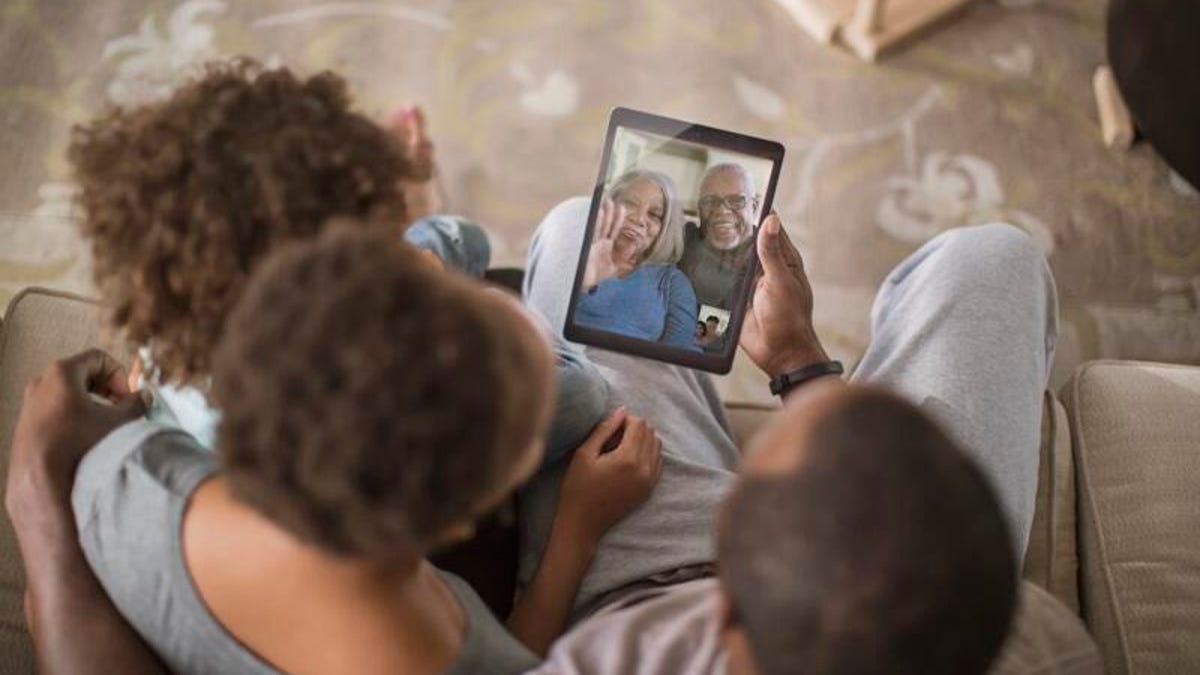 Why You Can Trust CNET
Why You Can Trust CNET 6 Devices to Keep Tabs on Your Aging Family Members Without Invading Their Privacy
You can ensure their safety, even when you can't be there.

You may not always be able to see your grandparents, but these devices will help you know they're safe.
There's no doubt that the ongoing pandemic has made it harder to stay in touch with friends and loved ones. And because anyone over 65 is at a higher risk of falling seriously ill, that's doubly true for seniors and grandparents. Without regular contact, it can be scary to not know whether they're doing OK or not. Thankfully, in today's age you don't have to be physically with your grandparents to be able to keep an eye on them, or send help in the event of an emergency.
There's a wealth of assistive devices for the senior citizen or older adult in your life. These high-tech devices are way beyond usual safety essentials like a shower bench, automatic pill dispenser or simple emergency button. I've rounded up six safety devices for seniors that will let you virtually monitor the safety and well-being of your older loved ones without compromising their independence or privacy.
If your grandparents are anything like mine, attempts to buy them cell phones always fail. iPhones have too many bells and whistles, but when you introduce them to an old flip phone they say that the buttons are too small.
Does this problem sound familiar? Send your elderly family member a Jitterbug Flip 2 -- it's a basic mobile phone with bigger buttons, a brighter screen and a louder speaker. It also has voice-dial capability and a magnifier with a flashlight, so it works as an all-purpose tool. Beyond giving you an easy way to reach your elderly parent or grandparent, the Jitterbug Flip 2 can also serve as a quick way for a senior to raise the alarm if they need to contact an emergency service.
When your grandparent is prone to falls, it's tough to not be able to check up on them and help whenever they need it. A security camera may seem like a good option, but do you really want to see every single thing the elderly family member in your care does?
With the TENVIS wireless camera, you'll only see 15-second bursts of video, triggered when the camera detects motion (so not actual fall detection, but still fall detection). It's a single device with a 360 degree view, and it also has two-way audio for real-time communication. If you see your grandparent doing something that concerns you, you can instantly check in with them and call an emergency service for help if necessary.
It's currently only available in a 2-pack, so you can keep an eye on multiple rooms at once.
Some elderly folks are prone to wandering, and when you're not around to keep an eye on them this habit can get dangerous. The GhostCord Floor Mat can alert you if your grandma is on the move -- just place it outside your family member's room or apartment, and it will send you an alarm when it detects them attempting to leave.
The mat is cordless with beveled edges and a non-slip grip so it won't present a falling hazard to your loved one. It's a helpful protective measure for any grandparent with memory or awareness issues. Note that you'll need to purchase a separate monitor.
Read more: The Best Thermometer for Cold and Flu
"Help, I've fallen and I can't get up!" We've all seen those commercials for medical alert systems, but people often have the same question -- what if I can't (or don't remember to) push the button?
The Philips Lifeline medical alert system solves this concern by detecting falls for you -- there's no button pushing necessary. It's worn as a pendant or a wristband, and is able to distinguish between falls and regular movement. The device is also water resistant with a long-lasting battery, so you won't have to worry about charging it. Two-way voice communication will allow the user to talk directly to the Philips Lifeline response crew and let them know if they need urgent help.
After a one-time $50 activation fee, the system is $30 a month.
Maybe you're confident in the minute-to-minute safety of your elderly loved one, but you're still worried they'll forget to take their medication. To make sure they're staying on top of health management, introduce Pria into their life. It's a smart pill dispenser (a step up from an automatic pill dispenser) that alerts your relative when it's time to take their medication. It then verifies their identity through facial recognition or a PIN before doling out their supply.
You'll be able to use an app that shows you when they took the medication and if they missed a dose. The device also has built in capability for two-way video calls, allowing for frequent check-ins.
The Pria subscription is free for the first six months, then $9.99 a month after that. It's only available in the US, but if you're located elsewhere there are a number of other automated medication dispensers on the market.
While access to your regular physician's office may currently be limited, it's still important to keep track of your vital signs. The iHealth Feel Wireless Monitor will keep track of your blood pressure and detect any irregular heartbeat. It sends results to your mobile device over Bluetooth, so if you're buying one for an elderly loved one, they can keep you updated on any changes in measurements.
Monitoring your blood pressure during these stressful times is a simple way to take your health into your own hands -- research shows that adults with hypertension who monitor their blood pressure at home (with or without additional support) are more likely to successfully lower their readings than those who don't.

